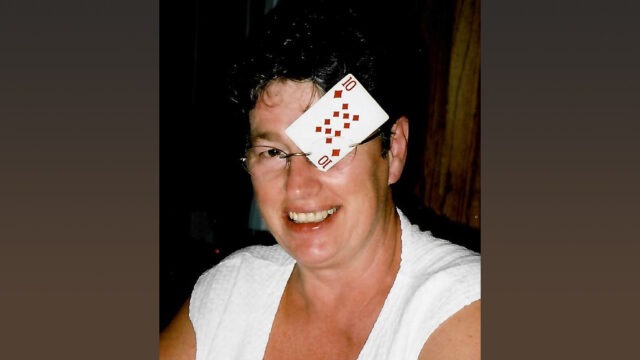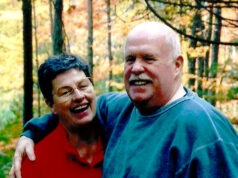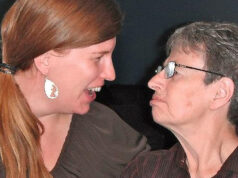Suzanne: And welcome to Answers for Elders Radio Network. And we are here with Lianna Marie, who is an expert on Parkinson’s disease, and she has many books on Parkinson’s, and a new book, “The Parkinson’s Path,” and you can reach her also at AllAboutParkinsons.com. And we’re glad to have you with us, Lianna. And we’re gonna talk about a topic I think that we all deal with, if there’s a devastating diagnosis, whether it’s Parkinson’s, anything like that. But it’s dealing with the disappointments. You’ve been dealt a bad hand in life. I just read something where there was a person that had a terminal disease that was just an amazing individual, and she died at 37. And we think about what kind of meaning can you have with your life, and how do you support those people to have as full a life as possible. So, Lianna, welcome back to Answers for Elders. We’re always glad you’re here.
Lianna Marie: Thanks Suzanne. Yeah, and I’m smiling, but I know when we talk about having disappointments, it’s not a happy conversation necessarily. But the goal here is to, yes, acknowledge these disappointments that are gonna happen over a period of time with a chronic illness like Parkinson’s. We can all expect a different path with Parkinson’s. But, let’s be completely honest, there’s disappointments along the way in terms of things that are taken away, things that we might not be able to do anymore, over time. And in the case with my mom, it was over 30 years of slow, gradual disappointments, potentially, we could call them. But they were, but as we went through, we tried to replace — let’s say you, you lose this thing, but let’s try to gain another thing over here. And so in that way, I just want to talk today about some of the disappointments, practical or emotional that mom went through, and then kind of things that we were able to do to help her through those, or that she did herself.
And I do talk about the 30 years, because when someone’s diagnosed in their 40s, like my mom was, it’s not like, for example, someone who’s diagnosed in their 80s, it’s gonna look a lot different. So somebody in their forties, they’ve got their family, they’ve got their kids, there’s a big disappointment, because right away you’re like, “Oh, my gosh. I still, I’m juggling my, my job, my kids, my life, just everything, and I’m not retired yet. I’ve got stuff going on.” And so the disappointment is this future. How is that going to change my life, and not that fear of unknown, which we’ve talked about before. But honestly, one of the weird things that happens — I don’t know if this is weird, but it’s unexpected disappointment — was in the way that some of my mom’s close friends reacted to her diagnosis, and not all in a positive way that you might expect. And I think I will give them the benefit of the doubt, that I think back when that happened, there wasn’t a lot of as much information out there about Parkinson’s and it was a stigma, there was a stigma, as there still is. We talked about this in a previous podcast. And this concept that they had in their mind was that mom was now gonna be this frail invalid that couldn’t do anything. And so they changed their view about her.
Suzanne: They didn’t invite her to do things because they were worried about it.
Lianna Marie: Yeah, and so that was a huge letdown for my mom, if you can imagine. Of all the things I might have anticipated, that was not one of them. So dealing with that, and I was kind of a grieving if I look back on it, we got to cut bait from a couple of these friends because they are definitely not supportive. And that was a lesson that we learned over time and something that you probably hear in other diseases. I know with my sister when she was diagnosed with terminal cancer, and knowing that stress can exacerbate any disease process, negativity. it’s true. It does. And so the idea that for my sister to get rid of all the negative things, negative people, it sounds very cut-throat. But in my sister’s case really had to do that very quickly because unlike my mom, she had a lot less time, and her life span, and I realized that when I look back, it’s like a similar case to my mom where these people were not helpful. They were not. So that was a big disappointment, and then how we did dealt with it was really just saying, “ok, you know what, you’re in or you’re out, you’re on this boat with me or you’re not. But I’m just gonna say, “ok, I’m gonna focus on the people that are supportive because mom did have a lot really — as she would call them — gems in her life. Friends that were just fabulous, and family members that really supported her on her journey. And I would just say to everyone that that is a really key. It’s basic, but really, life is too short.
Suzanne: I see it happen in families all the time. You have the one person that is there no matter what with mom or dad that is declining, and then the rest of the family, they kind of go into their own quarters and they don’t show up to visit. Of course it’s why senior loneliness such a phenomenal statistic, which is just insane. But this is why, it’s like they don’t know how to deal with it. They don’t want to deal with it, they don’t want to make the effort, and so they stay away and it’s hurtful. So with me on the other side, I always say, it’s not about you, it’s about them. Show up, be supportive, be loving. And you don’t even have to talk if you don’t want to. The point is, is to be that person that will show up.
Lianna Marie: And it’s tough, though, on the other side, if your sibling is not being supportive as a care partner later on, and you’re like, they should be doing this, and it’s tough to let that go. And I’ve seen it over and over again as again. This is not the beginning phase of Parkinson’s. But later on, it’s very tough, and I hear that over and over again, and you know what? For me there’s no secret recipe, but letting them go and saying, you know what? That’s that’s their life, that’s their journey. This is my journey with my mom. This is my journey, and I’m gonna own as much as I can own of it. And I’m gonna focus on — again, that’s a disappointment, right? It’s a disappointment, but I gotta let it go. It’s not an easy task to just say, ok, well, I guess they’re not gonna help out the way I hoped they were going to help out, and I’m happy about it. I’m not happy about it.
A couple other things in terms of disappointments that I want to say is that I think about this movement disorder that Parkinson’s is. So a lot of things can relate to that, in terms of things that are disappointing and things that might be taken away. So if you are a very active person, and now you can’t be, that’s a huge disappointment. In my mom’s case, she was a knitter. If there was competition, knitting, my mom would have been a competitor because she was just the best to put things together. But if you can imagine those fine motor skills slowly deteriorating, and then her not being able to do that anymore. What could we replace that hobby with? It’s gradual. Ok, we can’t do this. What can we do next? And there was piano, but then it became singing, and then if it wasn’t singing, it was outdoors and working on her rock garden, and big things like that. And so it was always trying to shift, going, “OK, we can’t do them. Ok. What else can we do then keep focusing on, what can we do? Keep replacing: all right, that one’s gone.” And again, it wasn’t saying that we weren’t sad about it. It was just saying, well, we’re not dead yet. So let’s find another thing. Let’s find another, and be focused on that and try to replace it, and personally, that’s how I had to do it for care partnering, and certainly most of my disappointments would have come when mom had dementia. That piece being taken away, mom’s ability to have that relationship with me. And that’s the part I know you can relate to, and that would be the biggest disappointment. How did I deal with that, not very well at the beginning.
Suzanne: Disappointments happen, happen most often when you have expectations. And whether you’re a care partner and you’re trying to get your family members and have these, all these expectations. And I think that’s what I did wrong was I had expectations of my family that they never signed up for.
Lianna Marie: That they would be exactly like what you’re doing. Like why don’t you just do it, everything that I’m doing.
Suzanne: And that’s in any sort of relationship, I think more often that we can look at why are we disappointed in the fact that, “I’m really disappointed in my brother because he didn’t come for Thanksgiving,” and it could be my mom or dad’s last Thanksgiving dinner, right? And so I had all this in my head, “He should have been there, and why didn’t he do this? And we were all there, and we couldn’t have him in the pictures” and all these things. And this is what goes on, and then we get angry. And then brother’s going, “I just had to work.” I’m looking at it from, really, simplicity, but the whole point is, is I think pay attention to your expectations.
Lianna Marie: Expectations. That’s a great point. And I know we all, we often — people, oh, manage expectations again, not the easiest thing — because you’re like, “but I don’t get it. I don’t get why they can’t do this. It’s just so easy.” Well, it may be easy for you, but maybe not so easy for them, for whatever reason, and it’s not giving them an excuse. It’s just saying, hey, we’re not all built the same. So for that, it did take me some time to adjust my lens, if you will, that I was looking through everything, because I am guilty of sort of doing that kind of wagging my finger at one of my siblings, yet it wasn’t, it was a bit of a nothing for her. It was just me, and what my expectation was, a little higher than what they were doing. So, yeah, that is a big one. I cannot say enough that in general just it’s always good to keep the positive, keep those positive, find your best tribe, your support group, your support people, stick around them and focus on those folks instead of keeping your focus on the, on the one negative.
Suzanne: Yeah. Lianna, this has been a great conversation to have. And, again, we invite every one of you to listen to more of Lianna Marie’s podcast on your favorite podcast channel or at Answers for Elders, and looking forward to talking to you soon again, Lianna, thanks for being with us.
Lianna Marie: Thanks Suzanne.















